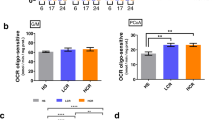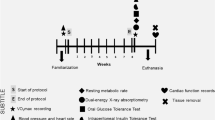Abstract
In patients, inactivity, obesity and insulin resistance are associated with increased incidence of heart failure. Rats selectively bred for low (LCR) intrinsic aerobic exercise capacity show signs of the metabolic syndrome including insulin resistance, compared to their counterparts bred for high intrinsic aerobic capacity (HCR). We reasoned that systemic insulin resistance in LCR should translate to impaired substrate oxidation and reduced insulin sensitivity in the heart. Isolated hearts were perfused in the working mode to analyze cardiac function, substrate oxidation patterns, insulin response, and oxygen consumption. After 22 generations of selective breeding, LCR displayed reduction of exercise capacity (LCR vs. HCR: distance 280 ± 12 vs. 1,968 ± 63 m, time 19.5 ± 0.6 vs. 71.7 ± 1.4 min, speed 19.2 ± 0.3 vs. 45.3 ± 0.7 m/min; all p < 0.05). At 21 weeks, body weight (+34%), tibia length (+6%), heart weight (+31%), and heart weight to tibia length ratio (+24%; all p < 0.05) were increased. LCR display higher random glucose, higher fasting glucose, and higher insulin levels in serum than HCR indicating the presence of insulin resistance in LCR. Here, in contrast, isolated hearts showed no differences in glucose (0.22 ± 0.02 μmol/min/g dry) or fatty acid oxidation (0.79 ± 0.10 μmol/min/g dry), oxygen consumption (28.3 ± 4.1 nmol O2/min/g dry) or cardiac power (18.6 ± 1.6 mW/g dry). Furthermore, sensitivity to insulin (Δglucose oxidation: +0.57 ± 0.095 μmol/min/g dry) was not different between the two populations. Low intrinsic exercise capacity and systemic insulin resistance in rats are not associated with changes in cardiac substrate oxidation, insulin sensitivity, oxygen consumption, or cardiac function. The lack of cardiac insulin resistance in the face of systemic insulin resistance supports a concept of different pathomechanisms for these two conditions.




Similar content being viewed by others
References
Bikman BT, Woodlief TL, Noland RC, Britton SL, Koch LG, Lust RM, Dohm GL, Cortright RN (2009) High-fat diet induces Ikkbeta and reduces insulin sensitivity in rats with low running capacity. Int J Sports Med 30:631–635
Boehm EA, Jones BE, Radda GK, Veech RL, Clarke K (2001) Increased uncoupling proteins and decreased efficiency in palmitate-perfused hyperthyroid rat heart. Am J Physiol Heart Circ Physiol 280:H977–H983
Boudina S, Sena S, O’Neill BT, Tathireddy P, Young ME, Abel ED (2005) Reduced mitochondrial oxidative capacity and increased mitochondrial uncoupling impair myocardial energetics in obesity. Circulation 112:2686–2695
Buchanan J, Mazumder PK, Hu P, Chakrabarti G, Roberts MW, Yun UJ, Cooksey RC, Litwin SE, Abel ED (2005) Reduced cardiac efficiency and altered substrate metabolism precedes the onset of hyperglycemia and contractile dysfunction in two mouse models of insulin resistance and obesity. Endocrinology 146:5341–5349
Doehner W, Rauchhaus M, Ponikowski P, Godsland IF, von Haehling S, Okonko DO, Leyva F, Proudler AJ, Coats AJ, Anker SD (2005) Impaired insulin sensitivity as an independent risk factor for mortality in patients with stable chronic heart failure. J Am Coll Cardiol 46:1019–1026
Doenst T, Guthrie PH, Chemnitius JM, Zech R, Taegtmeyer H (1996) Fasting, lactate, and insulin improve ischemia tolerance in rat heart: a comparison with ischemic preconditioning. Am J Physiol 270:H1607–H1615
Doenst T, Guthrie PH, Taegtmeyer H (1998) Ischemic preconditioning in rat heart: no correlation between glycogen content and return of function. Mol Cell Biochem 180:153–161
Doenst T, Han Q, Goodwin GW, Guthrie PH, Taegtmeyer H (1998) Insulin does not change the intracellular distribution of hexokinase in rat heart. Am J Physiol 275:E558–E567
Doenst T, Holden JE, Taegtmeyer H (1999) Limitations to the assessment of reperfusion injury with radiolabeled 2-deoxyglucose. Circulation 99:1646–1647
Fischer-Rasokat U, Doenst T (2003) Insulin-induced improvement of postischemic recovery is abolished by inhibition of protein kinase C in rat heart. J Thorac Cardiovasc Surg 126:1806–1812
Goodwin GW, Taegtmeyer H (1994) Metabolic recovery of isolated working rat heart after brief global ischemia. Am J Physiol 267:H462–H470
Hafstad AD, Solevag GH, Severson DL, Larsen TS, Aasum E (2006) Perfused hearts from Type 2 diabetic (db/db) mice show metabolic responsiveness to insulin. Am J Physiol Heart Circ Physiol 290:H1763–H1769
Haram PM, Kemi OJ, Lee SJ, Bendheim MO, Al-Share QY, Waldum HL, Gilligan LJ, Koch LG, Britton SL, Najjar SM, Wisloff U (2009) Aerobic interval training vs. continuous moderate exercise in the metabolic syndrome of rats artificially selected for low aerobic capacity. Cardiovasc Res 81:723–732
Hussain SO, Barbato JC, Koch LG, Metting PJ, Britton SL (2001) Cardiac function in rats selectively bred for low- and high-capacity running. Am J Physiol Regul Integr Comp Physiol 281:R1787–R1791
Ingelsson E, Sundstrom J, Arnlov J, Zethelius B, Lind L (2005) Insulin resistance and risk of congestive heart failure. JAMA 294:334–341
Koch LG, Britton SL (2001) Artificial selection for intrinsic aerobic endurance running capacity in rats. Physiol Genomics 5:45–52
Koch LG, Wisloff U, Wilkinson JE, Britton S (2007) Rat models of intrinsic aerobic capacity differ in longevity. FASEB J 21:A1401
Lloyd S, Brocks C, Chatham JC (2003) Differential modulation of glucose, lactate, and pyruvate oxidation by insulin and dichloroacetate in the rat heart. Am J Physiol Heart Circ Physiol 285:H163–H172
Mazumder PK, O’Neill BT, Roberts MW, Buchanan J, Yun UJ, Cooksey RC, Boudina S, Abel ED (2004) Impaired cardiac efficiency and increased fatty acid oxidation in insulin-resistant ob/ob mouse hearts. Diabetes 53:2366–2374
Morris EM, Whaley-Connell AT, Thyfault JP, Britton SL, Koch LG, Wei Y, Ibdah JA, Sowers JR (2009) Low aerobic capacity and high-fat diet contribute to oxidative stress and IRS-1 degradation in the kidney. Am J Nephrol 30:112–119
Murray AJ, Cole MA, Lygate CA, Carr CA, Stuckey DJ, Little SE, Neubauer S, Clarke K (2008) Increased mitochondrial uncoupling proteins, respiratory uncoupling and decreased efficiency in the chronically infarcted rat heart. J Mol Cell Cardiol 44:694–700
Noland RC, Thyfault JP, Henes ST, Whitfield BR, Woodlief TL, Evans JR, Lust JA, Britton SL, Koch LG, Dudek RW, Dohm GL, Cortright RN, Lust RM (2007) Artificial selection for high-capacity endurance running is protective against high-fat diet-induced insulin resistance. Am J Physiol Endocrinol Metab 293:E31–E41
Sato K, Kashiwaya Y, Keon CA, Tsuchiya N, King MT, Radda GK, Chance B, Clarke K, Veech RL (1995) Insulin, ketone bodies, and mitochondrial energy transduction. FASEB J 9:651–658
Schwarzer M, Faerber G, Rueckauer T, Blum D, Pytel G, Mohr FW, Doenst T (2009) The metabolic modulators, Etomoxir and NVP-LAB121, fail to reverse pressure overload induced heart failure in vivo. Basic Res Cardiol 104:547–557
Schwarzer M, Schrepper A, Pytel G, Mohr FW, Doenst T (2009) The development of heart failure in rats is associated with impaired insulin response and mitochondrial dysfunction. Thorac Cardiovasc Surg 56:P77
Sharma N, Okere IC, Duda MK, Chess DJ, O’Shea KM, Stanley WC (2007) Potential impact of carbohydrate and fat intake on pathological left ventricular hypertrophy. Cardiovasc Res 73:257–268
Spargo FJ, McGee SL, Dzamko N, Watt MJ, Kemp BE, Britton SL, Koch LG, Hargreaves M, Hawley JA (2007) Dysregulation of muscle lipid metabolism in rats selectively bred for low aerobic running capacity. Am J Physiol Endocrinol Metab 292:E1631–E1636
Taegtmeyer H, Hems R, Krebs HA (1980) Utilization of energy-providing substrates in the isolated working rat heart. Biochem J 186:701–711
Thyfault JP, Rector RS, Uptergrove GM, Borengasser SJ, Morris EM, Wei Y, Laye MJ, Burant CF, Qi NR, Ridenhour SE, Koch LG, Britton SL, Ibdah JA (2009) Rats selectively bred for low aerobic capacity have reduced hepatic mitochondrial oxidative capacity and susceptibility to hepatic steatosis and injury. J Physiol 587:1805–1816
Utriainen T, Takala T, Luotolahti M, Ronnemaa T, Laine H, Ruotsalainen U, Haaparanta M, Nuutila P, Yki-Jarvinen H (1998) Insulin resistance characterizes glucose uptake in skeletal muscle but not in the heart in NIDDM. Diabetologia 41:555–559
Vaag A (2008) To be predisposed to insulin resistance and type 2 diabetes. J Physiol 586:2421
vom Dahl J, Herman WH, Hicks RJ, Ortiz-Alonso FJ, Lee KS, Allman KC, Wolfe ER, Kalff V, Schwaiger M (1993) Myocardial glucose uptake in patients with insulin-dependent diabetes mellitus assessed quantitatively by dynamic positron emission tomography. Circulation 88:395–404
Wisloff U, Najjar SM, Ellingsen O, Haram PM, Swoap S, Al-Share Q, Fernstrom M, Rezaei K, Lee SJ, Koch LG, Britton SL (2005) Cardiovascular risk factors emerge after artificial selection for low aerobic capacity. Science 307:418–420
Wybranska I, Malczewska-Malec M, Partyka L, Kiec-Wilk B, Kosno K, Leszczynska-Golabek I, Zdzienicka A, Gruca A, Kwasniak M, Dembinska-Kiec A (2007) Evaluation of genetic predisposition to insulin resistance by nutrient-induced insulin output ratio (NIOR). Clin Chem Lab Med 45:1124–1132
Zhao Y, Richman A, Storey C, Radford NB, Pantano P (1999) In situ fiber-optic oxygen consumption measurements from a working mouse heart. Anal Chem 71:3887–3893
Author information
Authors and Affiliations
Corresponding author
Rights and permissions
About this article
Cite this article
Schwarzer, M., Britton, S.L., Koch, L.G. et al. Low intrinsic aerobic exercise capacity and systemic insulin resistance are not associated with changes in myocardial substrate oxidation or insulin sensitivity. Basic Res Cardiol 105, 357–364 (2010). https://doi.org/10.1007/s00395-010-0087-2
Received:
Revised:
Accepted:
Published:
Issue Date:
DOI: https://doi.org/10.1007/s00395-010-0087-2




